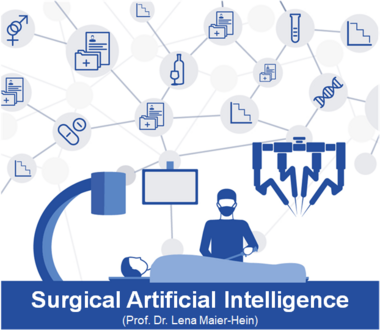Research Group Surgical Artificial Intelligence
in the Department of General, Visceral and Transplantation Surgery

Surgery is a central pillar of modern oncology. At the same time, its success strongly depends on the performing surgical team’s level of experience. Research suggests that surgeries performed by less experienced staff exhibit higher rates of complication, a large proportion of which could, in principle, be avoided.
The driving hypothesis of our research at the Surgical AI Division is that artificial intelligence (AI) based on surgical data science has the potential to revolutionize surgery by systematically elevating its safety, efficiency, and quality. Committed to the ultimate goal of creating benefit for both patients and clinical staff, and building upon principles and knowledge from diverse research fields including machine learning, statistics, computer vision, biophotonics, and medicine, we seek to harness the power of data within and beyond the operating room to develop intelligent systems for interventional cancer care. Our research particularly focuses on the intraoperative setting, a challenging environment in which clinical staff need to take in a multitude of different information from various sensors and devices while navigating complex anatomical structures, often under conditions of restricted view, make clinical decisions, and react to unforeseen events at any moment. Our research aims to facilitate this process and thereby enhance both surgical performance as well as safety. In terms of applications, we are specifically using the power of deep learning to develop modern imaging concepts based on biophotonics techniques that allow the non-invasive measurement of functional tissue parameters such as blood oxygenation deep within tissue. Another focus lies on the development of decision support systems that are able to integrate multimodal sensor and other patient data with factual and experiential knowledge to assist surgeons in intraoperative decision making in real time.
Key Publications Prof. Dr. Lena Maier-Hein
L. Maier-Hein, A. Reinke, P. Godau, M. D. Tizabi, F. Buettner, E. Christodoulou, B. Glocker, F. isensee, J. Kleesiek, M. Kozubek, M. Reyes, M. A. Riegler, M. Wiesenfarth, A. E. Kavur, C. H. Sudre, M. Baumgartner, M. Eisenmann, D. Heckmann-Nötzel, T. Rädsch, L. Acion, M. Antonelli, T. Arbel, S. Bakas, A. Benis, M. Blaschko, M. J. Cardoso, V. Cheplygina, B. A. Cimini, G. S. Collins, K. Farahani, L. Ferrer, A. Galdran, B. van Ginneken, R. Haase, D. A. Hashimoto, M. M. Hoffman, M. Huisman, P. Jannin, C. E. Kahn, D. Kainmueller, B. Kainz, A. Karargyris, A. Karthikesalingam, H. Kenngott, F. Kofler, A. Kopp-Schneider, A. Kreshuk, T. Kurc, B. A. Landman, G. Litjens, A. Madani, K. Maier-Hein, A. L. Martel, P. Mattson, E. Meijering, B. Menze, K. G.M. Moons, H. Müller, B. Nichyporuk, F. Nickel, J. Petersen, N. Rajpoot, N. Rieke, J. Saez-Rodriguez, C. I. Sánchez, S. Shetty, M. van Smeden, R. M. Summers, A. A. Taha, A. Tiulpin, S. A. Tsaftaris, B. Van Calster, G. Varoquaux and P. F. Jäger. Metrics reloaded: Recommendations for image analysis validation. Nature Methods, pp: 195-212 (2024) (https://www.nature.com/articles/s41592-023-02151-z)
L. Ayala, T. J. Adler, S. Seidlitz, S. Wirkert, C. Engels, A. Seitel, J. Sellner, A. Aksenov, M. Bodenbach, P. Bader, S. Baron, A. Vemuri, M. Wiesenfarth, N. Schreck, D. Mindroc, M. Tizabi, S. Pirmann, B. Everitt, A. Kopp-Schneider, D. Teber and L. Maier-Hein. Spectral imaging enables contrast agent-free real-time ischemia monitoring in laparoscopic surgery. Science Advances, Vol 9, Issue 10 (2023) (https://www.science.org/doi/full/10.1126/sciadv.add6778)
L. Maier-Hein, S. Vedula, S. Speidel, N. Navab, R. Kikinis, A. Park, M. Eisenmann, H. Feussner, G. Forestier, S. Giannarou, M. Hashizume, D. Katic, HG. Kenngott, M. Kranzfelder, A. Malpani, K. März, T. Neumuth, N. Padoy, C. Pugh, N. Schoch, D. Stoyanov, R. Taylor, M. Wagner, GD. Hager, P. Jannin. Surgical data science for next-generation interventions. Nature Biomedical Engineering, Vol. 1(9): pp 691 (2017). (https://www.nature.com/articles/s41551-017-0132-7)
Full list: https://scholar.google.de/citations?user=RZWGD-IAAAAJ&hl=de
Profile
Lena Maier-Hein is a full professor at Heidelberg University (Germany) and managing director of the National Center for Tumor Diseases (NCT) Heidelberg. At the German Cancer Research Center (DKFZ) she is head of the division Intelligent Medical Systems (IMSY) and managing director of the "Data Science and Digital Oncology" cross-topic program.At the University Clinic Heidelberg, she leads the research group "Surgical Artificial Intelligence". Her research concentrates on machine learning-based biomedical image analysis with a specific focus on surgical data science, computational biophotonics and validation of machine learning algorithms.
She is a fellow of the Medical Image Computing and Computer Assisted Intervention (MICCAI) society and of the European Laboratory for Learning and Intelligent Systems (ELLIS), president of the MICCAI special interest group on challenges and chair of the international Surgical Data Science initiative. During her academic career, she has been distinguished with several science awards including the 2013 Heinz Maier Leibnitz Award of the German Research Foundation (DFG), the 2017/18 Berlin-Brandenburg Academy Prize and the 2024 German Cancer Award. She has received a European Research Council (ERC) starting grant (2015-2020) and consolidator grant (2021-2026).
CV: https://www.dkfz.de/en/imsy/team/pdfs/2024-02-CV_Maier-Hein.pdf?m=1710233930&







